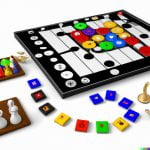The classic Ludo board game has been a beloved pastime for generations, captivating players with its simple yet exciting gameplay. With a rich history and widespread popularity, Ludo has become a staple in the world of traditional board games. In this article, we will explore the timeless appeal of the classic Ludo board game, including its origins, gameplay, and enduring relevance in today’s gaming landscape.
Dating back to ancient India, Ludo’s origins can be traced to the royal game of Pachisi. Over time, this game evolved into the modern version known as Ludo, gaining popularity not only in India but also across the globe.
The classic Ludo board game consists of a colorful board with intricate pathways and four sets of tokens for each player. With its straightforward rules and elements of chance and strategy, it’s no wonder why Ludo has stood the test of time as a favorite among players of all ages.
What sets the classic Ludo board game apart is its universal appeal – whether played casually at home or in competitive settings. The game brings people together for moments of fun and friendly competition. Its ability to entertain and engage players makes it a go-to choice for social gatherings or family game nights. As we delve deeper into the world of classic Ludo, we will examine what makes this timeless game a cherished activity that continues to endure through generations.
How to Play Classic Ludo Board Game
The Classic Ludo board game is a timeless and entertaining way to bring friends and family together for a fun-filled gaming experience. Whether you’re a seasoned player or a newcomer to the game, learning how to play the Classic Ludo Board Game is simple and enjoyable. Below are detailed instructions on how to set up the board, the rules of gameplay, and some tips and strategies for winning:
- Setting up the board: The Classic Ludo Board Game is typically played on a square board with a cross-shaped design. Each arm of the cross consists of 15 spaces, making a total of 60 spaces on the board. Players choose their color-token (red, green, yellow, or blue) and take turns rolling a single die to determine who goes first.
- Rules of gameplay: Once the game begins, players must move their tokens around the board in a clockwise direction from their starting area to their home column. To do this, they must roll a 6 with the die to get one of their tokens out of the starting area. From there, they continue moving their tokens based on the numbers rolled until all their tokens reach their respective home columns.
- Tips and strategies for winning: While luck plays a significant role in Ludo, there are still some strategies that can be employed to increase your chances of winning. It’s important to consider which token to move when you have multiple options. Blocking opponents’ tokens and choosing when to move new tokens out of your starting area can also be crucial tactics in achieving victory.
Learning how to play Classic Ludo Board Game is not only easy but also offers plenty of opportunities for an enjoyable gaming experience with friends and family.
So whether you’re looking for a casual game night activity or simply want to learn something new, playing Classic Ludo can offer plenty of entertainment while providing an opportunity for socialization and fun competition among players.
Variations of Classic Ludo Board Game
Different Versions Around the World
Ludo, known by different names such as “Parcheesi” and “Mensch ärgere dich nicht,” has a rich history across various cultures around the world. Each version maintains the basic premise of moving pieces around a board, but with unique twists in rules and gameplay. For example, the Indian version of Ludo, known as “Pachisi,” involves players using cowrie shells instead of dice to determine piece movements. In Germany, “Mensch ärgere dich nicht” features a slightly different board layout and strategy elements.
Unique Rules and Features
In addition to geographical variations, Classic Ludo board game also comes in different editions with their own set of rules that add complexity or new dynamics to the game. Some versions introduce themed boards and pieces based on popular licensed characters or settings, while others may include special action cards that impact gameplay. These variations provide players with fresh experiences and challenges when playing Ludo, catering to a wide range of preferences and playstyles.
Adapting Ludo for Different Audiences
Game designers have also created Ludo adaptations specifically tailored for different demographics or interests. There are simplified versions for young children that focus on basic counting and color recognition skills, as well as more strategic variants designed for serious gamers who enjoy deep decision-making processes. The adaptability of Classic Ludo board game ensures that there is something for everyone, making it a timeless classic enjoyed by people from all walks of life.
Benefits of Playing Classic Ludo Board Game
The benefits of playing the classic Ludo board game extend beyond just entertainment. One of the most significant advantages is the social interaction and bonding that comes with playing Ludo with friends and family.
As a game that can be enjoyed by people of all ages, it provides a great opportunity for loved ones to come together and spend quality time with each other. The collaborative nature of the game also encourages teamwork and communication among players, making it a perfect way to strengthen relationships.
In addition to its social benefits, playing Ludo also offers cognitive development for both children and adults. The game requires strategic thinking, decision-making, and planning ahead, which can help improve critical thinking skills. For children, playing Ludo can enhance their numeracy skills as they count and move the pieces on the board. It also teaches them about rules and fairness in gameplay. Adults can benefit from improved focus, problem-solving abilities, and mental agility through regular play.
Furthermore, playing the classic Ludo board game provides stress relief and entertainment for all players involved. Whether it’s a casual game or a competitive match, the lighthearted nature of Ludo makes it an enjoyable experience that can lift spirits and create moments of laughter. This form of relaxation can have a positive impact on mental well-being and overall mood, making Ludo not just a game but also a source of joy for many individuals.
Educational Value of Classic Ludo Board Game
The classic Ludo board game is not only a source of entertainment but also a valuable tool for learning. Through gameplay, individuals can develop various skills and concepts that have a lasting impact on their cognitive abilities.
One of the primary educational benefits of playing Ludo is the enhancement of critical thinking and decision-making skills. Players are constantly faced with strategic choices, such as which piece to move and how to navigate the board, requiring them to think ahead and consider potential outcomes.
Furthermore, playing Ludo fosters the development of mathematical concepts, particularly in younger players. Counting spaces on the board and calculating dice rolls are fundamental arithmetic skills that are continuously exercised during the game. Additionally, the concept of probability comes into play when deciding which piece to move based on the numbers rolled, providing a practical application for understanding likelihood and chance.
Moreover, the social aspect of playing Ludo contributes to emotional and interpersonal development. The game encourages communication, sportsmanship, and cooperation among players, promoting positive social interactions and building essential relationship skills. Overall, the educational value of classic Ludo extends beyond academic knowledge to encompass holistic growth in various aspects of an individual’s development.
| Educational Benefits | Description |
|---|---|
| Critical Thinking | Enhances strategic decision-making and forward planning skills. |
| Mathematical Concepts | Develops arithmetic abilities through counting spaces and understanding probability. |
| Social Interaction | Promotes communication, sportsmanship, and cooperation among players. |
Classic Ludo Board Game in Pop Culture
References in Media
Classic Ludo Board Game has made its mark in popular culture, appearing in various forms of media such as movies, TV shows, and literature. The game has been featured in classic films like “The Life Aquatic with Steve Zissou” and “And Then There Were None,” showcasing its timeless appeal and universal recognition. Additionally, Ludo has been portrayed in television series like “The Big Bang Theory” and “Stranger Things,” further cementing its relevance in modern entertainment.
Influence on Modern Board Game Culture
The influence of Classic Ludo Board Game extends beyond its appearances in media and has contributed to the popularity of modern board games. Many contemporary board games have drawn inspiration from Ludo’s simple yet engaging gameplay, leading to the creation of new iterations that cater to diverse audiences. Moreover, Ludo’s presence in pop culture has sparked renewed interest in traditional board gaming, prompting enthusiasts to explore a wide range of classic games.
Legacy and Enduring Appeal
As one of the most iconic board games worldwide, Classic Ludo Board Game has left a lasting legacy on pop culture. Its enduring appeal lies not only in its entertaining gameplay but also in its ability to bring people together across generations. Through its representation in various forms of media and its influence on modern board game culture, Ludo continues to stand as a beloved pastime that resonates with individuals of all ages.
Classic Ludo Board Game Tournaments and Events
Ludo may be a classic board game, but it is far from being outdated. In fact, all around the world, there are tournaments and events dedicated to this beloved game. Whether you’re a casual player or a serious competitor, participating in Ludo tournaments can be an exciting and enriching experience.
Here are some major Ludo tournaments and events that draw participants from all corners of the globe:
- World Ludo Championship: The World Ludo Championship is a prestigious event that brings together top players from different countries to compete for the title of world champion. This tournament features intense matches and showcases high-level strategies and gameplay.
- National Ludo Competitions: Many countries host national level competitions that attract skilled players from within their borders. These events serve as qualifiers for international tournaments and provide an opportunity for local talent to showcase their abilities.
- Ludo Charity Events: In addition to competitive tournaments, there are also charity events organized around the game of Ludo. These gatherings not only raise funds for important causes but also foster a sense of camaraderie among players while enjoying the game.
If you’re interested in getting involved in the Ludo community or testing your skills against other enthusiasts, participating in these tournaments and events can be an excellent way to connect with fellow fans of the game and take your gameplay to the next level. Keep an eye out for upcoming events in your area or consider organizing one yourself to bring together fellow fans of this timeless board game.
The Future of Classic Ludo Board Game
As technology continues to advance, the classic Ludo board game has also seen modern adaptations and digital versions. These new forms of the game have made it more accessible to a wider audience. With the availability of mobile apps and online platforms, players can now enjoy Ludo without needing a physical board or pieces. This shift to digital has sparked a resurgence of interest in the game, particularly among younger generations who are more accustomed to gaming on electronic devices.
In addition to digital versions, there is potential for continued popularity of the classic Ludo board game in the gaming industry. Many board game cafes and bars have embraced Ludo as part of their offerings, creating spaces for people to gather and enjoy traditional games in a social setting.
Furthermore, the rise of board game conventions and events has provided a platform for enthusiasts to come together and celebrate their love for Ludo. These factors indicate that there is a growing demand for in-person gameplay experiences, which bodes well for the future of the classic Ludo board game.
Overall, despite the evolution of gaming trends, there is an enduring charm to the simplicity and engaging nature of Ludo that will likely secure its place in the hearts of players for years to come.
| Modern Adaptations | In-Person Gameplay Experiences |
|---|---|
| Mobile apps and online platforms | Board game cafes and bars |
| Digital versions | Board game conventions and events |
Conclusion
In conclusion, the Classic Ludo Board Game has proven to be a timeless and beloved game that continues to captivate players of all ages. Its rich history and universal appeal have contributed to its enduring popularity, making it a staple in households and social gatherings around the world. The game’s simple yet engaging gameplay, along with its emphasis on social interaction and strategic thinking, has made it a favorite pastime for many.
As we look to the future, the Classic Ludo Board Game shows no signs of fading into obscurity. With modern adaptations and digital versions becoming more accessible, there is great potential for the game to reach new audiences and continue thriving in the gaming industry. Additionally, the sense of community and camaraderie fostered by Ludo tournaments and events further solidifies its place in popular culture.
Ultimately, it is clear that the Classic Ludo Board Game offers not only entertainment but also educational benefits and opportunities for personal growth. Whether played for leisure or in competitive settings, Ludo has left an indelible mark on gaming culture and will undoubtedly continue to do so for years to come. So why not experience this enduring game for yourself? Gather your friends or family, set up the board, and let the timeless fun of Ludo begin.
Frequently Asked Questions
Which Ludo Game Is Original?
The original and traditional Ludo game is known as “Pachisi” and has been played in India for centuries. It is believed to have originated in ancient India and was later modified into the modern version of Ludo that we know today.
How Do You Play Classic Ludo?
Classic Ludo is played on a special board with a dice and four tokens for each player. The objective of the game is to move all your tokens around the board and into your home area before your opponents do.
Players take turns rolling the dice, moving their tokens based on the number rolled, and strategizing to block their opponents’ progress.
What Is the Old Name of Ludo?
The old name of Ludo, “Pachisi,” comes from the Indian language Hindi-Urdu word “pachis,” which means twenty-five, referring to the original number of spaces on the Pachisi board. This ancient game has been enjoyed by people across generations and has evolved into various versions worldwide, including the popular modern version of Ludo.

I love playing all kinds of games – from classics like Monopoly to modern favourites like Ticket to Ride.
I created this blog as a way to share my love of board games with others, and provide information on the latest releases and news in the industry.





